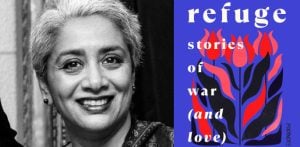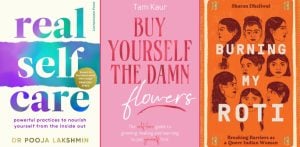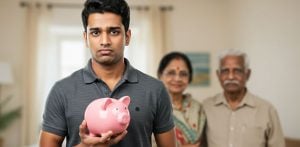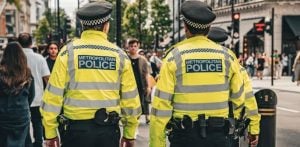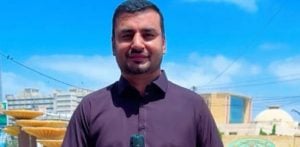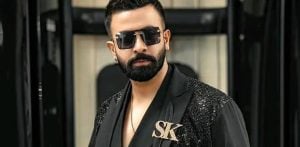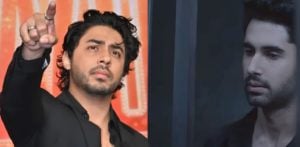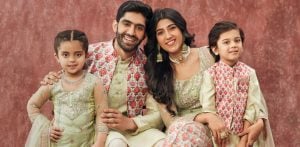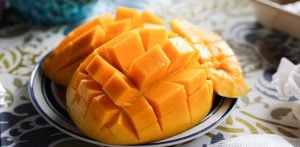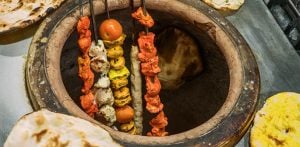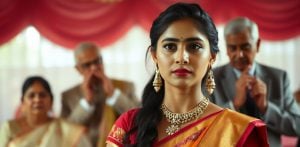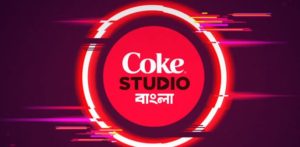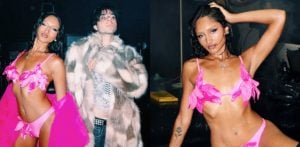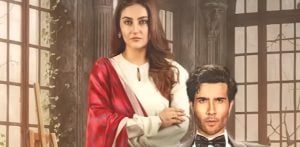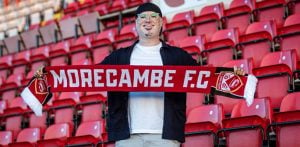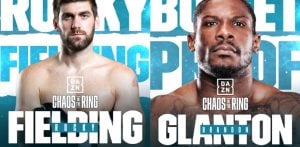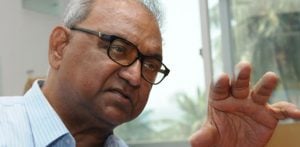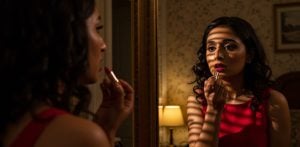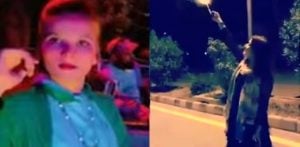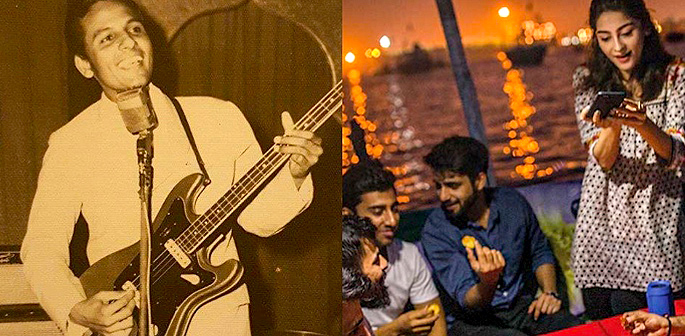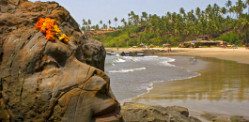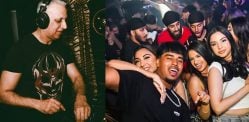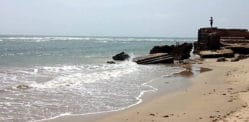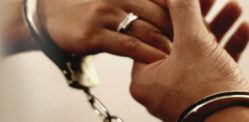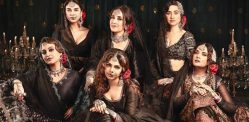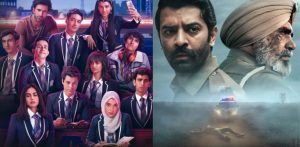“The evening’s entertainment was billed as ‘Dinner, Dance, Cabaret'."
The Karachi nightlife has been through years of transformation. From the vibrant clubs of the 70s to the spirited food hubs and underground scene we see in 2021.
Karachi is the largest and most cosmopolitan city in Pakistan.
The city serves as the countries transport hub and is home to Pakistan’s largest seaports. Alongside this, Karachi is Pakistan’s premier industrial and financial centre.
While in the 21st century, Karachi is known for being Pakistan’s financial and transport centrepiece, in the 70s it was also famous for something else.
Pakistan is often known for being a conservative country that has a ban on alcohol and nightclubs. However, this was not always the case.
The city was in fact first coined as the “City of Lights” for its vibrant nightlife in the 60s and 70s.
Karachi’s active nightlife and ‘live and let live’ attitude may come as a shock to many
In the years following the 1947 independence, Karachi became renowned for its nightlife.
DESIblitz explores Karachi’s past life in more detail, especially looking into the club culture of the 70s and how the nightlife has taken a change.
Pakistan in the 60s-70s
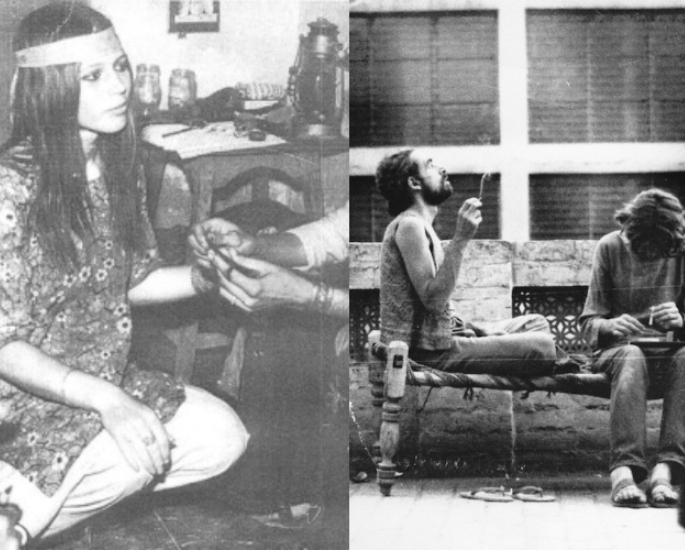
From the 50s to the 70s, the nighttime environment in Karachi was very different from what many would have expected.
Cabaret dancer, Marzyeh Kanga, told the Tribune:
“Way back in the ’60s and ’70s, Karachi was a very different place to be. We had bars and dance shows and the society was free and not ‘frustrated’ like it is now.”
In the years after the 1947 independence, Pakistan had a very liberal attitude. Journalist, Guillaume Lavallie, maintained:
“The golden-era began in the 1950s and rolled on until prohibition in 1977, which was followed by a slew of policies that drastically altered society.”
Before Islamabad became the capital of Pakistan, Karachi was in fact the capital of the country.
As the capital city, Karachi witnessed a thriving tourist industry and was the home to the countries embassies.
Due to this, many westerners visited the city. Considered as one of the cleanest capital city’s in the world, alcohol was freely available and the nightclub scene was bustling.
Looking into the culture of 60s Pakistan, The Citizen states:
“In the 1960s and 70s, Pakistan’s public life was dominated by the country’s western educated, liberal elite.”
Pakistan was also part of the “hippie trail”, therefore, the country was visited by many foreigners.
The hippie trail was the overland journey taken by hippies from the mid-50s to the late-70s. The journey, which began in Europe came to a finish in India.
Pakistan was in fact an essential famous stop on this journey. The travellers often started in London, then went on to Turkey, Tehran, Herat, Kabul, and then Pakistan.
An article by Propergaanda sheds light about their entry into Pakistan:
“They would first arrive in Landi Kotal after passing through the Khyber Pass.
“Quite a few travellers have recounted that they encountered many smugglers openly attempting to sell them opium or counterfeit guns that the town was infamous for.
“After that those on the trail would alight in Peshawar. Where they sought out Pakistan’s renowned hash.”
They further reveal about their journey:
“After having a smoke fest in Peshawar, the next stop for hippies on the trail would be Lahore.”
Overall Pakistan had a more liberal attitude, however, the energetic nightlife was witnessed the most in Karachi at the time
Leon Menezes, a singer from the band ‘The In Crowd’, who was popular during this period, spoke exclusively to DESIblitz. He asserted:
“Karachi was a really really fun capital city.”
In an article, which Leon wrote, he mentions:
“With the city full of embassies and served by a host of foreign airlines, the mix of international and local patrons enjoyed themselves into the early hours of the morning.”
Karachi’s nightlife included atmospheric clubs, cultural live music, alcohol, and exotic dancers. It showed the spirited energy that fuelled the development of Pakistan after achieving independence.
Nightclubs
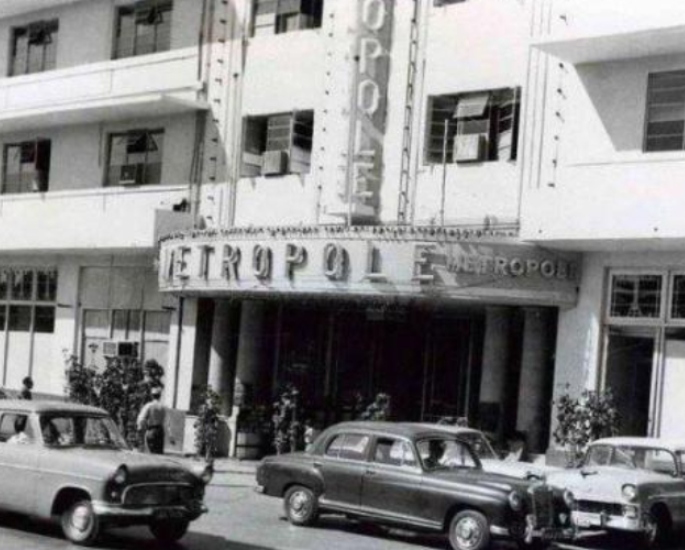
Karachi was the host to many nightclubs and bars during the 60s and 70s. The clubs were mainly on a floor in a hotel.
Leon mentions of the alcohol link, stating:
“The hotels had fully-stocked bars, including local brews, and catered to a wide selection of tastes.”
Some of the hotspot nightclubs were:
- The Discoteque at the Metropole Hotel
- Penthouse at Hotel Excelsior
- Nasreen Room at the Intercontinental Hotel
- La- Gourmet at the Palace Hotel
- Playboy at the Taj Hotel
The popular nightclubs in hotels catered for different clientele, with Leon asserting:
“Hotel Metropole and Palace Hotel, The Beach Luxury – and later the Inter-Continental were the crown jewels.
“While the Excelsior, Imperial, Taj, and Central hotels offered a more risqué set of entertainment.”
Speaking to DESIblitz, Leon expressed how the Discotheque at the Metropole attracted more of a younger crowd:
“The Discotheque part of the Metropole wasn’t high end; it was very casual.”
He further mentions the cost and size of an alcohol drink:
“Beer used to be 10 rupees a bottle for a nice big bottle, which most of us couldn’t afford.”
The hotels were quite close to each other, at locations such as Napier Road and Saddar.
Alongside these big nightclubs, there used to be lower-end bars and liquor stores dotted around Karachi.
Nightclubs and bars were visited by a range of people in Karachi. In particular, many celebrities and politicians used to enjoy a drink at them. Leon says”
“Even people like Mr. Bhutto used to come, and all these other people who then became senior politicians.”
A video by the Citizens Archive of Pakistan also highlights the night scene at the Metropole :
“It [Metropole] was a very very modern hotel. The people who visited this hotel were younger, as well as a lot of foreigners.
“Every night there was dancing and then on NYE people brought a whole hall – it was such a beautiful time.”
New Year’s Eve parties at nightclubs were all the rage then. Leon elaborates on how the vibe on New Year’s Eve was like no other:
“You couldn’t get a space anywhere if you wanted to go out on New Year’s Eve because there were people at each and every nightclub and location.”
With such an incredibly inclusive club scene, Karachi became a poignant hotspot in South Asia.
Although, it was the entertainment within these clubs and bars that brought an inevitable cultural shift.
Live Music
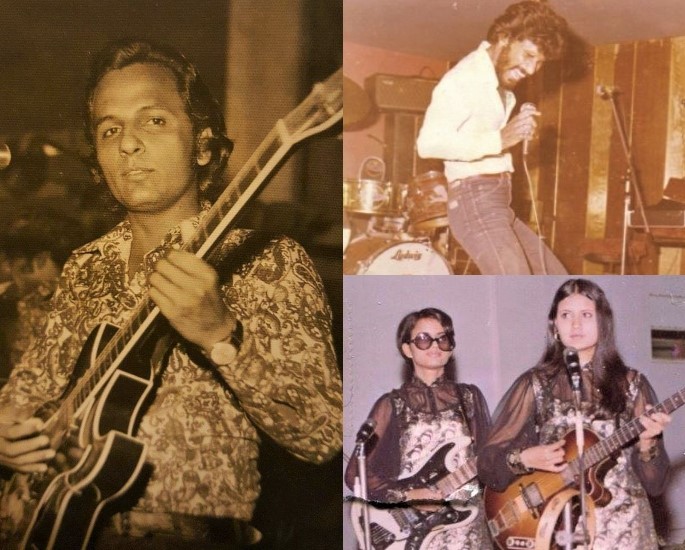
Something that characterised the nightclubs and bars of Karachi was the live bands playing.
Many people went to these events to listen to some amazing live music that was mainly performed by local bands that were big in the 60s and 70s.
Some of the bands often played six nights a week at the hotspot places.
Legendary band, Talismen, used to play at the nightclub at the Beach Luxury Hotel and blues band, the Keynotes, played at the Nasreen Room at the Intercontinental Hotel.
While the popular band, The In Crowd, often played at the Discotheque at the Metropole Hotel.
Leon Menezes was in the band, which was formed in 1968-69 and consisted of five members.
The In Crowd grew in popularity during this time and played at nightclubs, as well as at President Zulfikar Ali Bhutto’s inauguration.
Leon, speaking to DESIblitz, recalls some early memories :
“My brother Ivan and I had been playing in bands since we were in school. He was two years older than me.
“We played wherever we could – weddings, parties, schools, eventually growing up to play nightclubs.”
The live music bands mainly played covers of western music. It was a mixture of dance, rock, pop and jazz music.
Telling us specifically about The In Crowd, Leon expresses:
“So, we started as ‘dance’ bands and The In Crowd evolved a bit to introduce the music of Santana, Deep Purple, King Crimson, Chicago, Hendrix, while also playing “dance” music at The Discotheque.”
Speaking about his band days, Leon said:
“Right now, whatever music is available anywhere in the world is available to you right now, in those days it wasn’t the case.
“We used to listen to the radio and then come and practice those songs – that’s what we used to do.
“We had this little Phillips cassette recorder and recorded off the BBC and Voice of America then went and practiced.”
During this time a Pakistani girl band emerged, The Xavier Sisters. The Xavier Sisters was a group of five sisters, formed in 1961. They earned the status as Pakistan’s first all-girl band.
An Instagram post by account Purana Pakistan notes:
“In 1969, the Xavier Sisters became the first Karachi-based band to have an international contract that took them to Tehran.”
Tehran is the capital city of Iran, which meant the exclusive girl band had an out-of-country music agreement. The first Karachi-based band to do so.
The Xavier Sisters played all over Karachi, including at the Intercontinental hotel. They sang pop, jazz, and dance songs in English.
However, after much success and recognition, the group broke up in 1975 when their family migrated to Canada.
Live bands were extremely popular during these days. The most well-loved bands were often booked up quickly. Leon maintained:
“As a musician, you would be booked up 6 months in advance just to play for New Year’s Eve.”
The live music at these clubs was well-loved and the main form of entertainment there. Leon mentioned how the music framed the night:
“The order of music was that you would warm-up and then play some more popular songs, and (then) you played the louder music.”
He added that love came into the equation as night began settling in:
“Towards the end of the evening, you wind down because people had romantic intentions.”
Aside from the live music in nightclubs, Leon reminisces:
“There was a wonderful tradition of having jam sessions on a Sunday, in various places and people used to get together and sing and dance.”
Live music was also played at fashion shows as Leon remembers:
“All of a sudden this thing for fashion shows came around and they had live music.
“Hotels would have a battle of the bands and have 5 or 6 bands play and have a fashion show, it picked up a lot. Nowadays the fashion shows are done a lot differently.”
The LIVE music scene is what made the nightclubs so popular during this period.
Although most of the music was westernised, the unfiltered talent of these musicians elevated the art within Pakistan and made music much more accepted.
Dancing
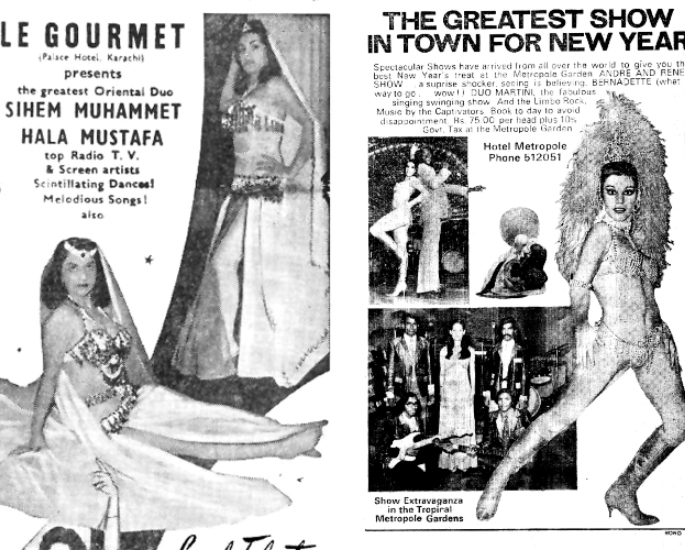
Even though live music and bands were booming amongst the Karachi nightlife, there were more glamorous means of entertainment which is overlooked. The Tribune asserts:
“Night clubs — with legal alcohol and professional belly dancers, elegantly swirling their bodies around — are (almost a) forgotten time in Pakistan.”
Leon Menezes emphasised this by reporting:
“The evening’s entertainment was billed as ‘Dinner, Dance, Cabaret’.”
Alongside the music and alcohol, cabaret dancers were a major form of entertainment. Cabaret dance shows were held in some of the major hotels between the mid-50s and 70s.
Some of these hotels include Hotel Metropole, Palace Hotel, InterContinental Hotel Beach Luxury Hotel, and The Excelsior.
The shows often had local dancers, while some shows included international performers.
These global performers were usually from Lebanon, Russia, and Turkey. They toured different countries for performances.
Leon, speaks on the array of performances, saying:
“The performances went from classy sophistication to downright sleaze.”
One popular Pakistani dancer was Panna, who was also a film star. She was a regular well-loved dancer at Karachi’s first nightclub, Le Gourmet, located in the Palace Hotel.
Another popular Pakistani cabaret artist was Marzyeh Kanga, known as Marzi, who worked as a cabaret dance artist for twenty-five years.
Marzi had been fond of dancing since she was a little girl, yet she took it up as a career at the age of eighteen.
Her young and energetic vibe landed her many performances in clubs in Karachi.
She danced in Hotel Excelsior’s nightclub Penthouse, as well as the Intercontinental Hotel’s Nasreen Room nightclub, Palace Hotel’s La Gourmet nightclub, and the Taj Hotel’s nightclub Playboy.
Marzi also gained international recognition for her dancing. She was also successful in Singapore, as well as Australia where she won the ‘Juvenile Award for Australian Television.’
The dancing at these clubs added to the allure of Karachi’s nightlife.
In an Instagram LIVE post, Pakistani playwright, Anwar Maqsood recalled growing up in Karachi, disclosing:
“They used to fly in cabaret dancers from Beirut, England, Brazil…they used to dance…there were four or five hotels back then.”
He went on to further express the price for an entry pass, which was quite expensive a the time:
“Back then a ticket used to cost Rs 200 (87 pence), that was a lot of money, and you had to buy your own drinks as well.”
Check out the full video of what Anwar Maqsood had to say on Karachi’s club culture in Urdu:
Prohibition
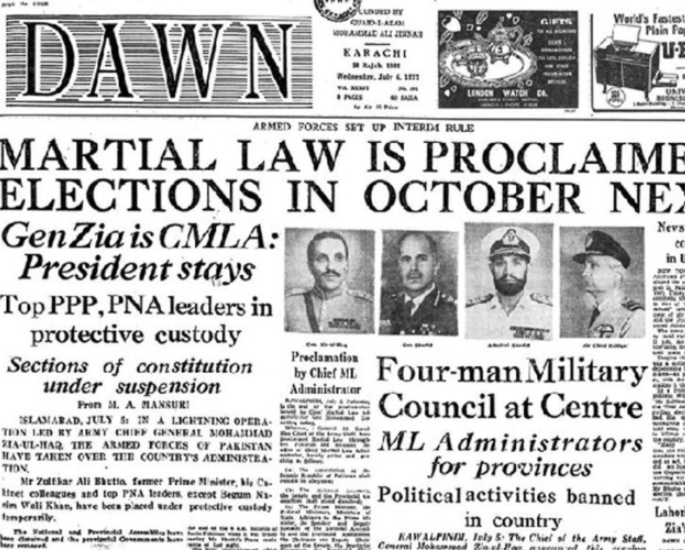
The bubbly nightlife of Karachi changed drastically in the late 70s with the prohibition of 1977.
Prohibition is when the manufacture, selling, and consumption of alcohol is forbidden by law.
Historically, there have been many cases of prohibition worldwide. Most famously the United States had a nationwide prohibition of alcohol between 1920-1933.
As discussed, from Pakistan’s independence in 1947, the country had a fairly liberal attitude towards alcohol consumption.
The journey to the banning of alcohol in Pakistan began in the early 70s.
In 1973, Zulfikar Ali Bhutto’s government in fact rejected a resolution to ban the sale of alcohol by the religious parties in the National Assembly.
The government rejected this because they had bigger issues to resolve.
In 1977 an election was held where the Pakistan People’s Party (PPP) government led by Bhutto were re-elected.
However, there was a lot of controversy surrounding the election, with the Pakistan National Alliance (PNA) accusing the PPP of rigging the results.
After the election, the PNA demanded a “re-polling, release of opposition politicians, the closing down of nightclubs and bars and a complete ban on the sale of alcohol.”
Bhutto caved in to the increasing pressure of these requests. In April 1977, the Bhutto government announced the ban on the sale of alcohol and the closing of nightclubs and bars.
During this time, the government cancelled the plans of opening a casino in Karachi, which was meant to open in May 1977.
The casino was financed by Tufail Shaikh, a Karachi-based businessman.
An essay by journalist Nadeem Farooq Paracha proclaimed:
“When Bhutto agreed with the opposition to close down the nightclubs and outlaw the sale of alcoholic beverages, Sheikh was shocked.
“However, Bhutto told him that it was a temporary measure which he would gradually reverse once things had cooled down.”
Due to the immediate pressure from religious parties, the prohibition order, issued by Bhutto, was only meant to be temporary. However, this was not the case.
In a military coup, the Bhutto government was overthrown by General Zia-ul-Haq in July 1977.
Late Zia-ul-Haq, who later became the sixth president of Pakistan, declared martial law.
Martial law is when a country is under military authority and the commander has unlimited authority to implement laws.
His major policy was the ‘Islamisation of Pakistan’. His martial law drastically changed various parts of society.
To enforce more ‘Islamic laws’, he wanted to tackle the consumption of alcohol.
During Bhutto’s days, the nightclubs and bars were closed down, however, alcohol was still being openly sold at social clubs.
Paracha explains the initial ambiguities:
“The April 1977 order had loopholes and did not carry any serious punishments against those selling or consuming alcohol.”
However, this changed under the rule of General Zia-ul-Haq. In February 1979, his government issued an ordinance known as the “Prohibition (Enforcement of Hudd) Order”.
This order stated that the selling of alcohol to Muslims of Pakistan was both illegal and anti-Islamic.
Under this order, penalties and severe punishments were put in place if anyone was caught drinking or selling alcohol.
An article by Medium also writes on this particular issues:
“Through a Prohibition Ordinance, the regime added a punishment of 80 lashes for those arrested for selling and consuming alcohol.”
However, the selling and consumption of alcohol were allowed for non-Muslims living in Pakistan and foreigners. This led to the opening of licensed alcohol shops.
Foreigners and non-Muslim Pakistanis had to get a permit from the government to be able to purchase from these shops.
Many of the anti-alcohol advocates justified this decision by explaining how alcohol was a colonial legacy. Paracha shared his thoughts on the matter:
“Ever since the late 1970s, anti-alcohol crusaders have maintained that drinking alcohol (by Muslims in Pakistan) was a ‘colonial legacy’.
“They suggest that the habit of drinking alcoholic beverages was imposed on the Muslims of the region by European colonialists.”
Paracha also gave reference to Pakistan’s most respected leader:
“This is how they respond especially when told that all the leading founders of Pakistan, including the highly respected lawyer and politician, Mohammad Ali Jinnah, liked to drink.”
This is a misconception. Alcoholic beverages have been consumed in South Asia for over 5000 years, long before the British Empire, with Paracha arguing:
“The inhabitants of the Indus Valley Civilisation were preparing alcoholic drinks made with sweet and starchy ingredients.”
Even after the Muslim invasion of India in the 13th century, “alcoholic beverages, bhang and opium were widely available in the region.”
The prohibition laws changed Pakistan’s drinking culture greatly and therefore had impacted Karachi nightlife.
How did Karachi change in 1977?
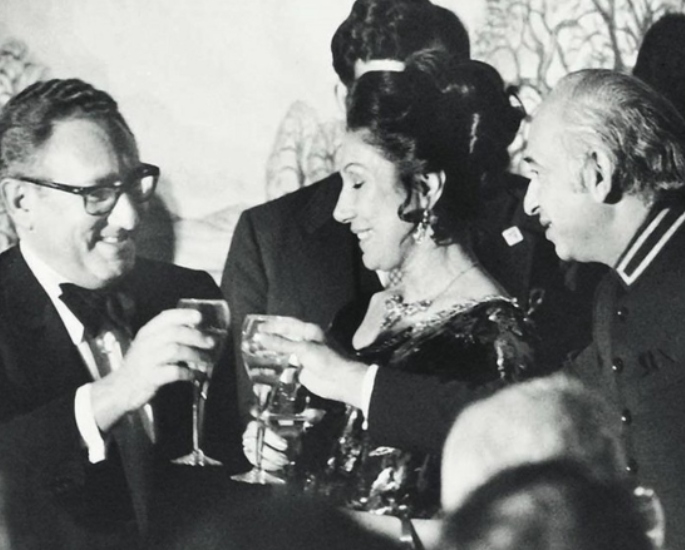
The prohibition laws of the 70s gad fundamentally changed the nightlife of Karachi.
Happy Minwalla, the owner of the Metropole Hotel, told DAWN:
“That (prohibition) completely changed the hotel industry in all of Pakistan. Karachi was all about entertainment, about fun, about people doing things. Sadly, the situation has changed.”
In 2011, Shehryar Fazli wrote a book named Invitation. The book was set in 70s Karachi during a more liberal Pakistan, just before Zulfiqar Ali Bhutto’s rise to power.
In an interview with Press Trust of India (PTI), Fazli expressed:
“Even if I was writing in the 1980s, the book’s setting would have been radically different.
“The Karachi of this novel, the Karachi of bars and cabarets, more or less vanished in 1976 with the introduction of prohibition.”
These comments show just how much the social climate changed in Karachi in a short period of time.
The nightlife of the past three decades completely vanished in Karachi, with the major nightclubs closing.
When asked how life changed after the prohibition, Leon Menezes tells DESIblitz:
“Everything changes; Karachi was the capital city; lots of foreigners; we were on the hippie trail; plenty of ‘stuff’ to smoke and share.”
“After prohibition, things went quiet for a long time in the Zia-ul-Haq years and it was difficult to get stuff.
There was another shift, following the death of Zia, and the arrival of Bhutto’s daughter:
“When the Benazir Bhutto era came in, all of a sudden, I realised there were so many parties taking place and refreshment was available.”
“The liberal vibe came back, this lasted about three years it didn’t last longer than that.”
It was not just the clubs and alcohol side of nightlife that changed, also the live music and dance scene was altered.
Marzi, the cabaret dancer, told DAWN about the stigma around dancing that developed:
“The society here was becoming more and more rigid and finally the nightclubs shut down and we lost the little bit of freedom that we had.”
She continues to reveal:
“Dancing was not only looked down upon but the performers were equalled with prostitutes.”
“The false sense of ‘superiority’ has harmed us so much and whatever is happening now is a reflection of that mess.”
It was not just Karachi that changed, the whole of Pakistani society changed drastically during this period.
An article by Propergaanda maintained how along with the nightlife, the hippie trail in Pakistan was no more:
“Unfortunately, with the Soviet Invasion of Afghanistan, the Iranian revolution and the Zia regimes public floggings and hyper-Islamisation the trail no longer remained safe to travel for foreigners.
“Towards the end of the 70s, there was barely anyone on the hippie trail.
“Now all that remains of this trail and its cultures are pictures and stories from those that once travelled it.”
From such a deeply cultured and booming industry to a confined and restricted landscape, Karachi’s clubgoers were in turmoil.
Karachi in the 21st Century
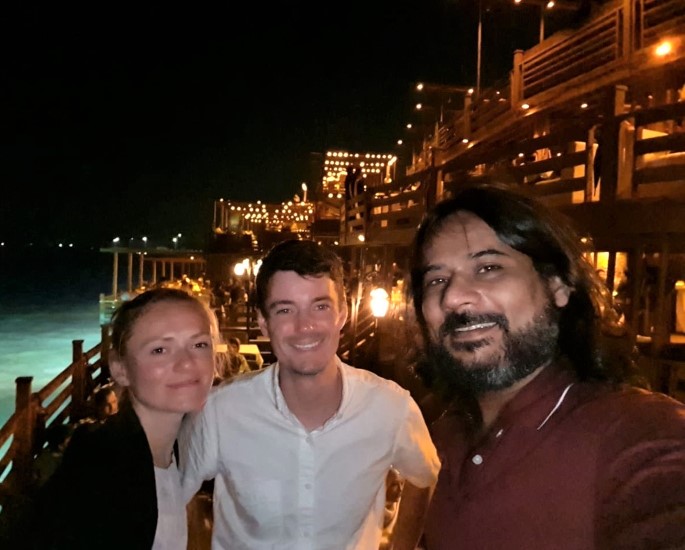
Walking through Karachi, the landscape has changed drastically from the 70s.
Much of the hotels that were once home to the thriving nightclubs have either completely vanished or been brought by different companies.
Speaking on some of these hotspot nightclubs, Leon mentions:
“The Metropole has gone to rack and ruin, in fact, they are in the process of selling for the last few years, but there is so many tenants that don’t want to move out.
“The intercontinental chain got brought out by Pakistani services limited, so that converted. The Palace Hotel many years ago became the Sheraton Hotel.
“The Airport Hotel kept going down and down in terms of quality and then Ramada took over and they renovated the whole place.”
He further expresses the differences from the past:
“The hotels don’t have live music anymore or stuff like that.”
While the days of open-flowing alcohol, belly dancers, and nightclubs may be over, it doesn’t mean Karachi’s nightlife has gone.
A 2015 article by DAWN maintained:
“Prohibition was the death knell for the clubs, but it did not eradicate the thirst for a nightlife.”
Meanwhile, Paracha says even with prohibition in place, alcohol was still widely available:
“Despite the 1977 prohibition on alcohol and the further strengthening of this prohibition in 1979, alcohol consumption remained prevalent (mainly due to bootlegging and illegal distilleries).”
As a “dry state” during the modern era, alcohol is still very much consumed within Pakistan.
However, it is mainly done behind closed doors and at house parties, rather than publicly like before.
In the 70s, the events at clubs were advertised openly. However in 2021, events are not advertised on social media, it is mainly circulated by word of mouth or if you know certain people.
Nightlife is celebrated illicitly, especially by Karachi’s elite high society. Fazli, the author of Invitation, enlightens PTI:
“Obviously, you can’t just walk into a bar or nightclub as you could back then.
“But people still have their fun, while the theoretically ‘underground’ establishments operate and make the necessary ‘arrangements’ so that the authorities look the other way.”
“So, the nightlife is still alive and well, even if it is far more constrained.”
Interestingly, one would think the development of social media and technology would revitalise Karachi’s club scene.
However, it seems to have gone in the opposite direction where certain parties and events are more secretive than mainstream.
Behind Closed Doors
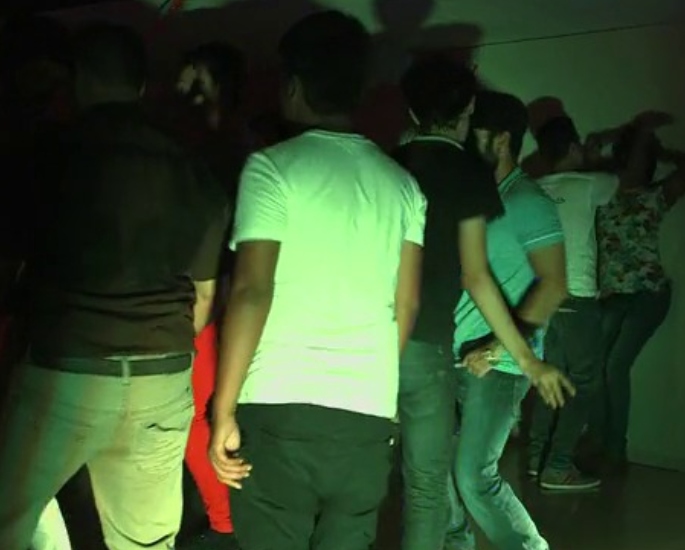
The prohibition had a devastating effect on Karachi’s nightlife in the 70s, however, the thirst for partying is still rich.
Once a booming nightlife filled with live musicians and unstoppable dancing, there is a new wave of underground clubs and bars starting to flourish.
Although Karachi still has particular spaces where it celebrates art, music and culture, it can be extremely confined.
Modern music like indie and hip hop are frowned upon and the lack of alcohol means people go deep into Karachi to satisfy all their needs.
With the return of Pakistani students who have tasted the buoyant entertainment of western countries, underground clubs and bars have become hotspots.
With no public invitations or social media posts, these hidden events are extremely secretive. Only close friends or word of mouth will direct you to these bouncing parties.
With alcohol flowing in a country where it is restricted, numerous locals hit these spots to socialise, be merry and listen to LIVE bands of old or new.
Akeel Akhtar, the owner of private nightclub “Hard Rock Cafe”, reveals:
“There’s no venue where people can go and hear this kind of music. Live music has an energy of its own.”
“So, all our people who grew up here love this stuff, it brings back memories for them.”
Many rich socialities who have the capabilities to throw private events often renovate their houses into clubs.
Although alcohol is sold in “wine shops”, more luxury drinks and brands are delivered to private homes by bootleggers.
The nostalgic feeling of the 70s provides an atmosphere like no other and many people try to reimagine those experiences in a more modern climate.
Becoming modern means there has been an increase in underground parties for gay people who feel safe within the wave of private events.
Being openly gay in Pakistan is rocky and considered illegal. LGBTQ+ rights are unequal and many people can face extreme backlash and embarrassment from authorities and families.
However, behind closed doors, everyone is welcome. Like the other hidden clubs, the gay scene can only be found from word of mouth, but the events are surprisingly vast.
Salman, a gay native of Karachi who shifted to the US, said:
“It pays to know a local who you trust. For example, when my Dutch/German gay friends visited, we were able to go to a gay party.
“As well as a transgender beauty pageant because at the time I was involved and connected to the local LGBTQ community.”
Although public places still embody the vibrancy of Karachi, these underground spaces aren’t just focused on alcohol but providing a place for all of its locals.
Karachi Beaches
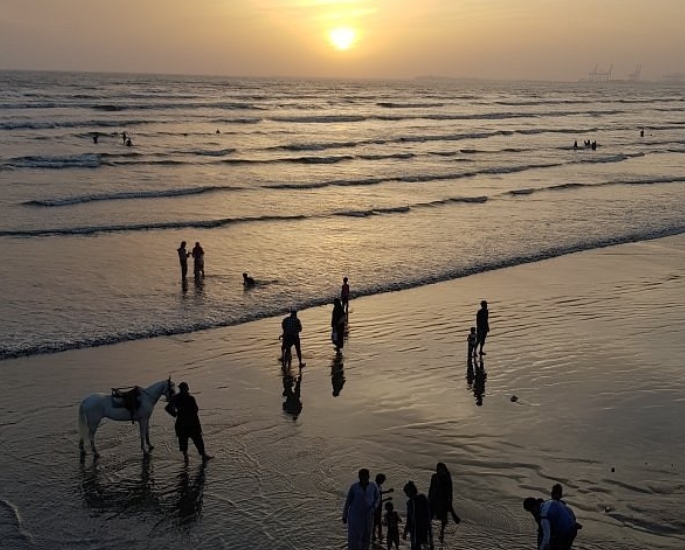
Karachi’s nightlife has drastically changed from the brash music and buoyant festivities of the 70s. However, the party scene still exists but has shifted from clubs to other means of entertainment.
A massive local and tourist attraction is Clifton beach. An iconic landmark that has remained prominent since the 60s.
Also known as “Sea View”, it is one of the most famous beaches in the world.
The beautiful seafront, colourful waves and majestic sunsets provide visitors with gorgeous views and an abundance of activities.
Previously offering only a few shops, Clifton beach now boasts camel rides, beach buggies, street food, parades, and celebrations for major events.
A breathtaking location with modern renovations allows many people to bask in the Karachi sun whilst enjoying the soothing nature of the ocean.
Although it is incredibly busy during the day, the beach is open 24 hours so it remains a hotspot for locals who are out enjoying the other attractions of Karachi.
Another incredible beach that lends itself to more evening activities is ‘Do Darya’. This is a stunning beach that boasts an abundance of seafront restaurants that come alive in the later hours.
Through the night, the surrounding buildings are elegantly lit up and allow the locals and visitors to truly witness the “City of Lights.”
Locals and tourists can feast their eyes on gorgeous moonlit waves, whilst diving into the delectable food at places like Sajjad Restaurant and Kababjees.
Karachi’s love of food is not only highlighted at beachside restaurants, but also evening beach barbecues that happen across the coast. Most notably at Hawke’s Bay beach.
Sizzling meats, cold juices, and the smell of charcoal are all on show. Most barbecues here start in the day and then carry on into the night, intoxicating the herds of people.
The beach is representative of Karachi’s evolving nightlife.
This shows that Karachi’s nightlife has evolved to be more inclusive of children and families. It isn’t just about clubbing or exotic dancing but creating a fresh culture of nightlife for all.
With other stunning beaches like Cape Mount and Tushan, Karachi’s exotic coast offers a contrasting vibe from its rowdy epicentre.
Cricket
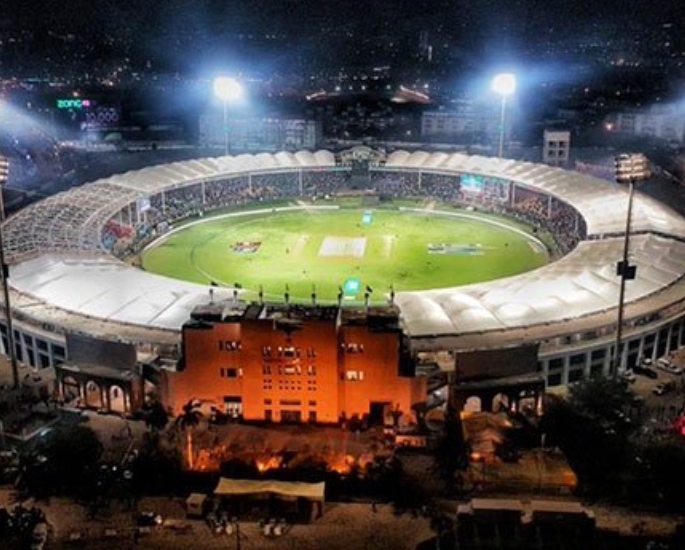
As the traditional Karachi nightlife started to dwell after the 70s, the appreciation and growth of cricket in Pakistan advanced.
When the National Stadium was built in 1955, the much-loved sport brought unity, entertainment, and history.
As the biggest cricket ground in Pakistan, the venue embodies the bustling atmosphere of Karachi and its locals.
Seating over 40,000 people, Pakistan achieved an incredible feat by avoiding a Test defeat on the ground from 1955 to 2000.
Other noteworthy records include Imran Khan’s eight wickets for 60 runs against India in 1982 and Younis Khan’s 313 runs against Sri Lanka in 2009.
This success brought rejuvenation to the area, especially with the introduction of floodlights which allowed games to be played at night.
Locals had a new definition of ‘nightlife’.
The stadium’s impressive stature has allowed it to host Cricket World Cup matches, intense rivalries with the Indian team, and in 2018, it accommodated its first Pakistan Super League (PSL) final.
Since its inception in 2016, the National Stadium has hosted three PSL fascinating finals between 2018-2020.
It is also the home of the PSL team, Karachi Kings, who won their first title in 2020 after beating the Lahore Qalandars.
Bringing masses of celebration, cricket has allowed local businesses to boom as herds of people relish in the festivities.
Here, families, teenagers, the elderly can head out in the evening warmth and absorb intense matches through the night.
Enjoying the local food and boisterous atmosphere, cricket has provided a huge shift in Karachi’s nighttime entertainment.
Described as a “fortress of Pakistan cricket”, the jubilation the stadium and sport have brought to Karachi’s entertainment and nightlife scene is invaluable.
Port Grand
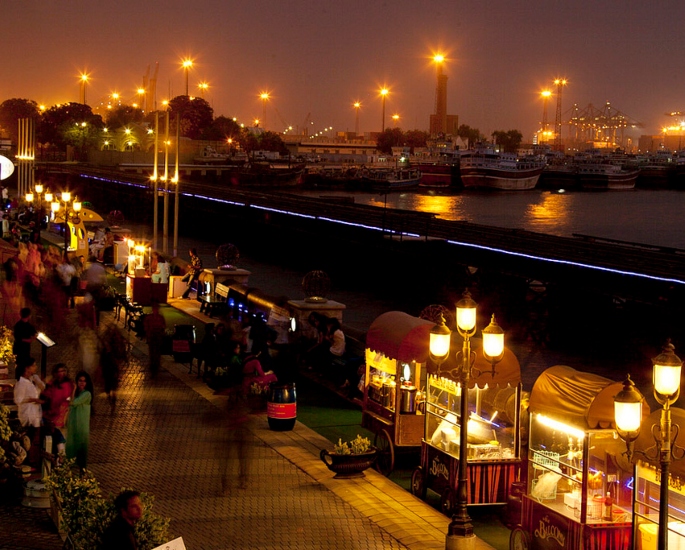
Even though Karachi may not offer the same westernised clubs and bars of the 70s, the Port Grand complex does well in filling that void.
The glistening hub puts the focus on the food industry of Karachi. As alcohol became banned after prohibition, the rise in food and drink restaurants excelled.
The Port Grand gifts people with exceptional street food vendors, modern shopping stalls, magnificent sea views, and wonderful architecture.
A wonderfully vibrant place that celebrates the culture of Karachi and was acknowledged for this by being awarded ‘Brand of the Year’ in 2016.
The president of Port Grand, Shahid Firoz gives a positive insight into this place:
“The landscapes and the natural setting of Port Grand all lend to the exceptional memories people make in this delightful destination.”
This ideal location is perfect for many Karachi natives, young and old, who wish to drink, eat, socialise and create memories.
The modernity of Port Grand is evident through its different cuisines like Chow Wow and Angelini’s Pizza.
However, it also provides numerous means of entertainment like karaoke and a 6D cinema.
Although the port is strict with its rules such as no alcohol or outside food, it just reinforces how mesmerising the place is and how much it lends itself to enjoyment.
So, even though Karachi has distanced itself from the exotic clubs of the 70s, it has done incredibly well in replacing those holes with more culturally rich focal points.
Food and Drink
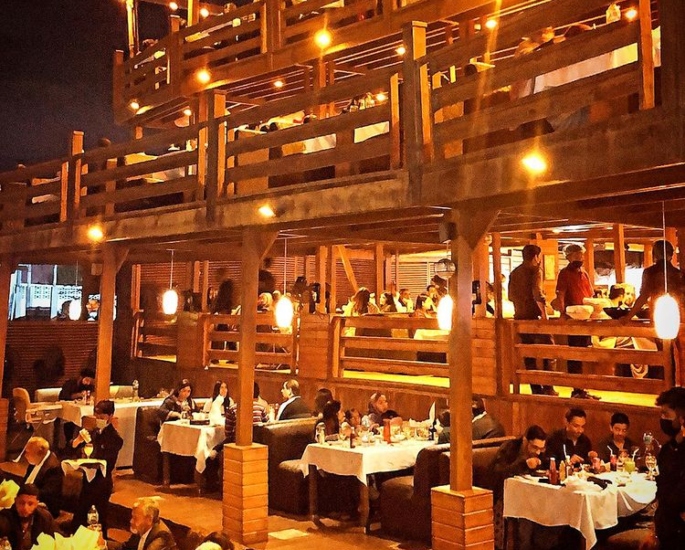
As many residents wonder about the lit-up streets at night, street food huts and fiery restaurants serve up local and delicious food.
Karachi’s diners are filled with smiling people devouring cultural dishes like Bihari tikkas at Meerath Kebab House or the Peshawari chapli kebab at A-one.
As the evening draws in, each restaurant delivers such an intoxicating atmosphere for locals and tourists.
With different cultures infiltrating Karachi’s food industry, there are many famous places where natives swear by.
Cafe Flo located in Clifton is a favoured destination as it remains open till the early hours.
Serving the best of French cuisine, this sophisticated haven is a thrilling place to enjoy great food like smoked salmon and herbed butter chicken.
For a more South Asian experience, the Lal Qila restaurant offers an enticing celebration of Mughlai and traditional Pakistani cuisine.
The stunning architecture, cultural landscapes and colourful decor help illuminate this beautiful restaurant against the evening backdrop.
Transforming into a musical courtyard on special occasions, Lal Qila illustrates the versatility and artistry that Karachi restaurants pride themselves upon.
As evening festivities lean towards restaurants instead of public clubs, many establishments have a range of entertainment on offer.
For example, the Ramada Plaza Hotel typifies this by having a poolside open-air barbecue that lures in hundreds of visitors each day for a night to remember.
Interestingly, as Menezes had worryingly asserted before, the Ramada had taken over the Airport Hotel.
However, this change in Karachi’s landscape has undoubtedly brought a boom in a new form of nightlife.
So, as much as the club memories of the 70s are missed, has the culture of Karachi decreased or merely shifted?
In addition, The Kolachi is another restaurant that embodies the change in Karachi’s nightlife.
Here, diners can enjoy the gorgeous sea breeze along with sumptuous dishes like the Kolachi karahi.
Fresh fish platters and exotic beverages relax the tourists and locals who are able to bask in the ravishing lights of the Karachi shore when they are turned on at night.
In addition, for those that just want to quench their thirst, Karachi has bustling places filled with fruitful milkshakes, potent teas and tasty juices.
Baloch Ice Cream has an array of delectable treats and shakes where locals and tourists can indulge in late at night.
Fanoos is another profound eatery that symbolises the change in Karachi nightlife.
Open all hours and with the occasional live bands performing, visitors can nourish themselves with the finest coffees and pastries.
However, as much as Karachi’s nightlife has seen a boom in thriving restaurants, their street food vendors have also seen a rise in popularity.
Burns Road is especially popular due to its numerous eateries and food vendors who make authentically fresh food.
With many establishments being open for more than 50 years, their recipes are unchanged which could explain how lovable the dishes are.
Like many of the restaurants, Burns Road is open till the early hours and people can feast on moist fried fish, Peshawari ice cream and sweet lassi.
Waqas Ali, an engineering student explains his love of Burns Road:
“Safe, clean and colourful atmosphere, sumptuous food, and a balmy night… what else do you want?”
Evidently, the change in Karachi’s nightlife has resulted in the boom of the food and drink industry.
The buzz around Karachi’s restaurants pays homage to its diversity but also reinforce how entertaining these places have become since the 70s.
Shopping Malls
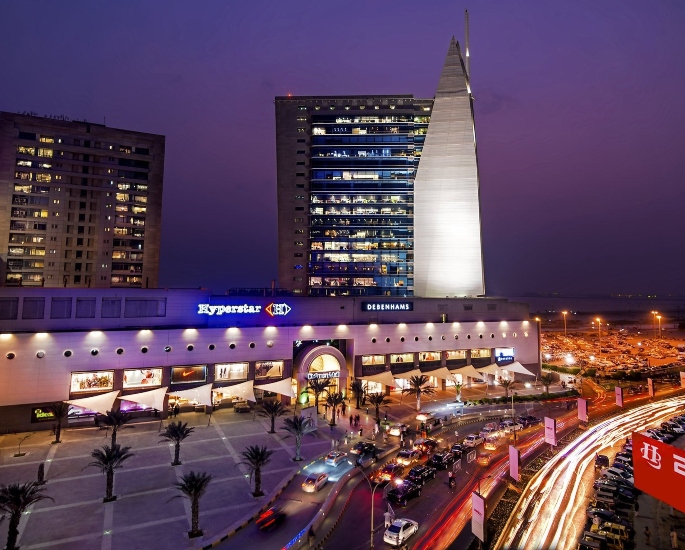
As much as Karachi locals and foreigners like to wine and dine in the evening, malls have become highly popular in the nighttime as well.
Many shopping centres are open till late and offer immersive experiences because of the fusion of culturally rich stores and more western brands.
With numerous malls situated around Karachi, Dolmen Mall stands out as the go-to spot. The biggest mall in Karachi is a hub of high-end brands, cafes and entertainment centres.
Situated near the sea, the beauty and modern decor of the mall provide an elegant sanctuary for shoppers to enjoy.
With impressive brands like Nike and Timberland, Dolmen Mall is a treat for consumers.
In Karachi, shopping is a big attraction, whether it is in market stalls or extravagant centres. So, it comes as no surprise how popular malls are.
The LuckyOne Mall is especially prominent. Opened in May 2017, it is considered one of the largest malls in the world, stocking over 200 retailers.
A shoppers delight, the mall also includes a two-storey theme park and an outdoor food street, the first of its kind.
With such fresh and innovative designs, Karachi’s malls are a gala of entertainment. Once visitors arrive, they can find everything at their disposal.
This is highlighted through Karachi’s tremendous Atrium Mall. Again, a focal point of high-end brands, restaurants, and cafes, the mall also boasts an in-house 3D cinema.
Swarms of people can shop for their weekend outfits, enjoy their favourite Pakistani dish and then top the night off with friends watching a movie.
Additionally, The Forum is believed to be one of the busiest malls in Karachi.
Enjoyed by numerous visitors each day, the centre often puts on events like the auto show. which honours vintage and classic cars.
Karachi’s malls are definitely one of the most popular sectors of the city’s nightlife.
Even though Karachi has always been interested in fashion and shopping, the malls have reinvented themselves to fit in with the new aspects of Karachi’s nightlife.
Food, drink, fashion, cinema, live music are all different elements of the evening’s entertainment, and the malls engulf these magical qualities of Karachi nightlife under one roof.
Entertainment
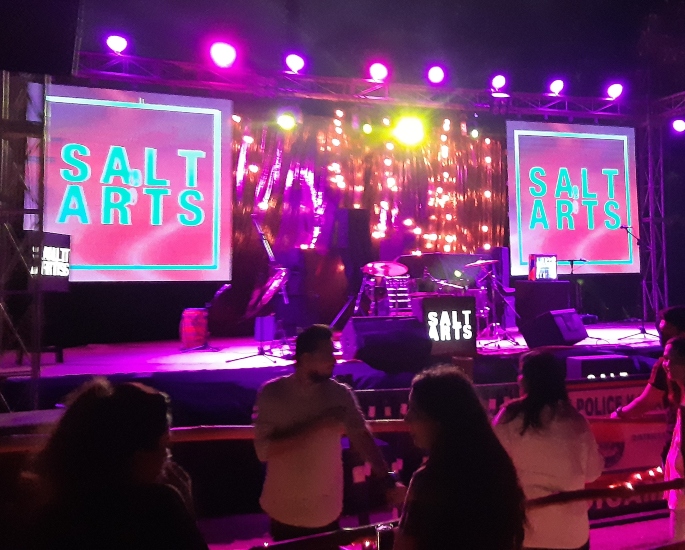
Although the restaurants, malls and beaches of Karachi have an abundance of joyful elements, the change in the nightlife meant a rejuvenation of other forms of entertainment.
The celebration and love for LIVE music mean that open-top concerts have been highly successful.
In 2015, musical stars Shafqat Amanat Ali Khan, Rahat Fateh Ali Khan and Umair Jaswal graced Karachi at the Jashan-e-Pakistan concert.
In 2019, local talent Atif Aslam performed at Beach Park in Clifton as well as Dutch DJ Alex Cruz, who experienced the roaring crowds of Karachi.
The most clever shift in Karachi’s nightlife has been how things are so easily accessible.
In the 70s, the idea was to go out, drink, sing, dance and then do it all again the following day.
However, now people go to the beach at sunset, light up the barbecues, dance to live music, have candlelight dinners and top the night with desserts. All in one seamless action.
Music has always been a big thing in Karachi since the 50s. So, open concerts come as no surprise as one of the most compelling sources of entertainment.
The embrace of musicality and appreciation of Desi instruments is no secret in the “City of Lights”. Therefore evening concerts where audiences are belting out lyrics are heard across Karachi.
However, the appreciation of the arts is not just about music, but also cinema as well.
Home to over 20 cinemas, Karachi has impeccably modern cinemas where locals and tourists can enjoy the thrill of Bollywood, Lollywood, and Hollywood movies.
The Megamultiplex cinema in the Millenium Mall boasts luxurious seating, much-needed AC and immersive audio systems.
In addition, the Cinepax cinema also allows guests to relax in the evening with reclining seats, private tables, dynamic picture quality and tons of snacks.
As the most famous cinema chain in Pakistan with twelve cinemas in nine cities, it is evident how fascinated Karachi is with this source of entertainment. This is emphasised by The Arena cinema.
Using a DP4K project, the brightest in the world, and spoiling guests with VIP boxes, state of the art surround sound and a theatre-like decor make this one of the most luxurious spaces in Karachi.
It provides a tremendous experience for tourists and locals and shows how Karachi’s nightlife has dramatically shifted from the entertainment of the 70s.
Is 70s Karachi a Distant Memory?
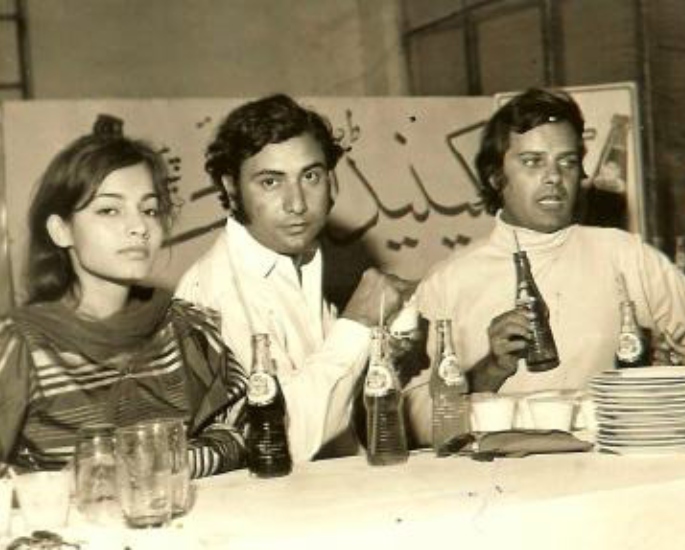
The dynamics of nightlife in Karachi have drastically changed. However, the question arises will Pakistani society ever go back to that more liberal vibe?
Leon discusses how he does not see that happening:
“The demographics of the city has changed a lot, if you look back in those days the population wasn’t that much, there used to be liquor stores everywhere and no one bothered about them.
“Now the demographic has changed completely, people have different interests, the value system has changed a lot.”
It will be very difficult for it to ease up a little bit, in terms of allowing people certain freedoms.”
Leon’s band days are very much in the past, but he now teaches at the Institute of Business Administration in Karachi:
“These are wonderful stories to tell my students who, poor things, are just too far away from a good time.
“When I tell students stories from the past I think they don’t believe me.”
In addition, Tony Tufail, a former Karachi nightclub owner, stated:
“Karachi would have gone on to become what Dubai became later if not for the ban.”
Post-independence Karachi was characterised by alcohol, live music, nightclubs, fun and bellydancers.
Karachi’s nightlife had vibrancy and allure like no other. It was a partygoer’s paradise and always had something to do for any budget.
The city’s past may seem like an alien planet for some, especially for those who have grown up seeing a different side to Pakistan.
Despite the distant memories of 70s Karachi, it is intriguing that underground bars and parties still happen, including events for different communities like LGBTQ+.
So, could Karachi once again have a nightlife that oozes with lustful dancers and daring music that eclipses its past life?
Moreover, the change in Karachi’s nightlife focused more on appreciating the beauty of Pakistan as a whole and the culture of its people.
Once hotels, clubs, and bars were the main attractions because of their boundless joy. And post the late-90s, beaches, cinemas, and malls became the colourful tools that allured locals and tourists.
Instead of trying to imitate a western landscape, the celebration of scenic islands, flavourful food vendors, and refined social hotspots means Karachi is catapulting itself as a vibrant place once again.


